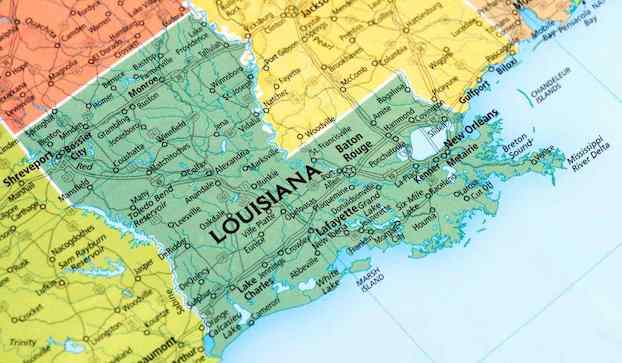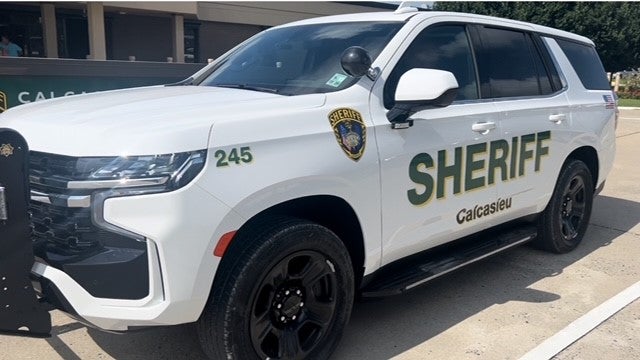Carbon capture opponents frustrated with eminent domain law
Published 6:04 am Saturday, March 1, 2025

- (Special to the American Press)
Opponents of proposed carbon capture pipelines in Southwest Louisiana voiced their frustrations to lawmakers on Thursday over concerns about an eminent domain law that allows companies to seize property with compensation, if a project is for the public good.
The law, which was passed by the Louisiana Legislature in 2020, was designed to help the oil and gas industry in the state, according to Rep. Troy Romero, who chairs the House agriculture committee.
“Everybody in the legislature both the Senate and House, voted for that bill,” Romero said during a public CO2 meeting Thursday in Lacassine. “We voted for it because we didn’t get the calls from our constituents who were concerned. What we got were calls from the oil and gas industry saying, ‘Please save my husband’s job. Please save the oil and gas industry’ and that’s what we were told. We were told this was going to be a move to help get the oil and gas industry going through a bad period. That’s why 100 percent of people in the House and Senate voted for it. Was it a good vote, no but we know that now.”
Romero said he voted for the bill because constituents had asked him to and because it was explained to legislators in a different way.
“We were being told that the vote we were going to make was going to help oil and gas,” he said. “It was going to help people keep their jobs. It was going to be the savior of oil and gas.”
“Was it a good decision?” he continued “Obviously today it is not. But at that point we thought it was the savior of the oil and gas industry until we could get President Trump in office and ‘drill baby drill.”
He said from everything he was told, it was going to be great and save the oil and gas industry but that was because he didn’t hear from constituents who are now against it.
“The most important thing that has happened since 2020 is that industry has done a horrible job at educating the public and things are moving too fast,” Romero said.
But he said the good news is legislators now have an opportunity to fix the problem with the help of constituents who are concerned about the CO2 industry.
“I have a bill that supports what Jeff Davis Parish wants and that is a local referendum to decide whether we want it or not,” Romero said.
Rep. Charles Owen is also introducing legislation that would allow for a statewide local option election. As with any bill, this measure must pass both the House and Senate, then be signed by the governor to become law.
Like many at the meeting, Romero said he is concerned about the 4,500 abandoned wells across the state that have not been properly. He also voiced concerns about the safety of the Chicot Aquifer, landowners’ rights and liability issues associated with CO2.
While many attendees opposed CO2 expansion in Southwest Louisiana, Romero said some areas of the state, including Cameron Parish, welcome these projects as they would enable them to sell the product to other countries.
“Most of us are just waking up to this and finding out about the CO2 initiative,” Renee Savant of Beauregard Parish, who manages the Louisiana CO2 Alliance, said.
Equilla Victorian of Oberlin said most residents were caught off guard by the initiative and are only now understanding the potential risks, including the safety of drinking water due to underground CO2 storage.
Sen. Mark Abraham said his perspective is to take it slow, gather as much information as possible, and listen to the scientists on both sides.
“I’ve learned in this process there are always two sides to every story and I know you might be 100 percent on one side and I get that, but that doesn’t mean that I can’t listen to the other side. So we are going to take it slow, understand the process and look at the science.”
“As a legislator, I am not going to let money decide what to do,” he said “I want to look at the scientific facts and how the environment is going to be protected.”
Many attendees at the meeting said they were also concerned about Class VI permits due to their association with higher risk levels.
Romero said that Louisiana currently has no Class VI permits and that lawmakers are working on legislation that would modify the permitting requirements. He said the Class VI permit process is currently extensive.
One woman argued that the lengthy permitting process for Class VI CO2 permits should have alerted legislators to potential risks. She questioned why companies would need to meet such extensive requirements if high risk wasn’t a factor.
Laurie Richard of Jennings said the lack of information among residents and legislators is troublesome.
Addressing Romero, she said, “You didn’t get all the information and neither did we and this is why we are here today. So from this point forward it is your responsibility to let everyone know.”
However, Romero said that is not his responsibility to inform everyone. He said his responsibility is to listen to his constituents and make a fair decision on how to vote on issues.
“We never had the opportunity to do the research to form an opinion until now,” Richard said.
Romeo said legislators review and vote on thousands of bills each year, making it impossible to be fully informed on every issue. He stressed the importance of constituent input in making informed and fair decisions.
Rep. Brett Geymann, chairman of the House Natural Resources Committee, said legislators are actively engaged in CO2 and stranded mineral issues, despite the public perception.
“Last year we had three complete, solid full days on carbon capture,” Geymann said.
He also mentioned that the NRC has met with first responders and others involved in a C02 pipeline rupture that occurred Satartia, MS in 2020 to learn more about the dangers involved and emergency response.





